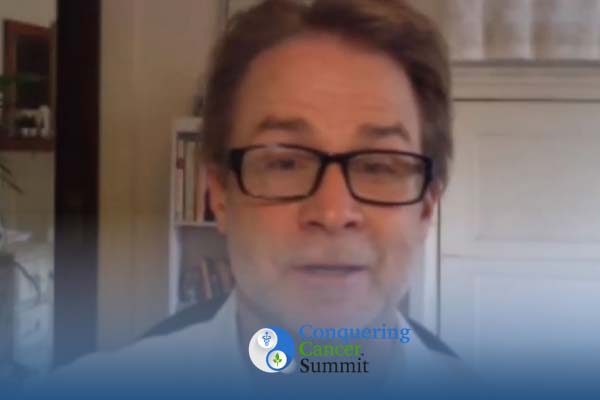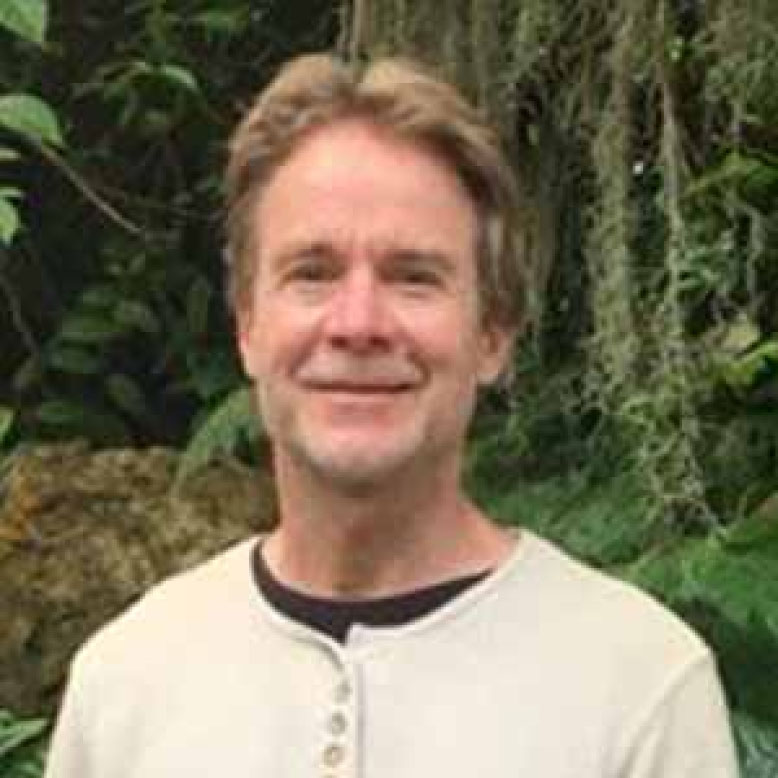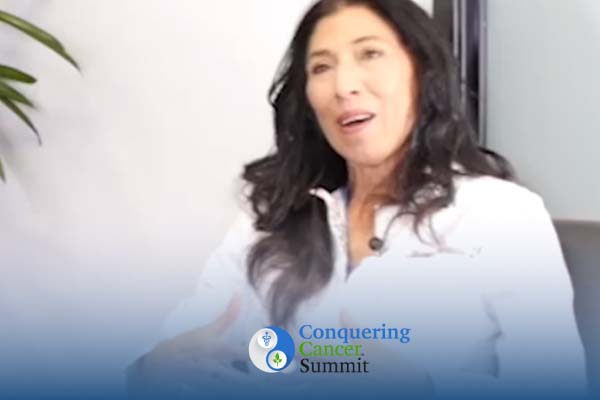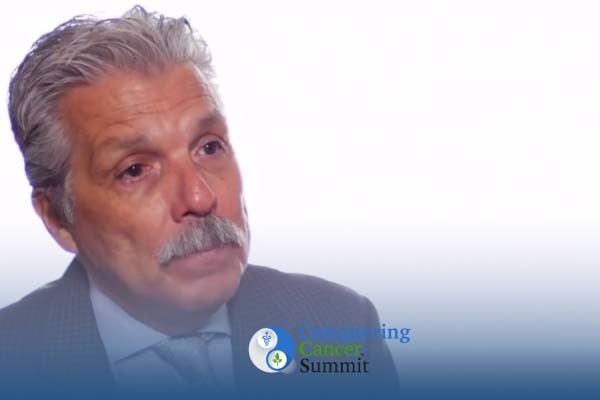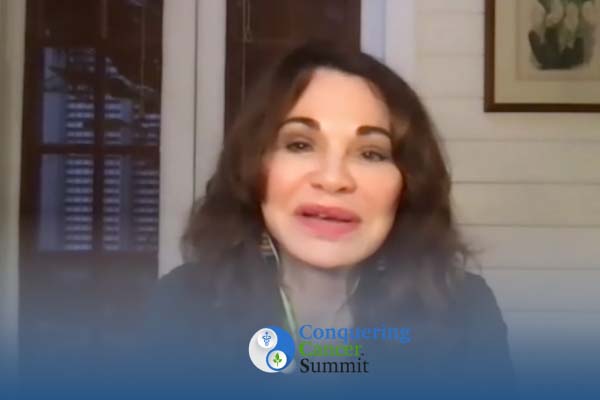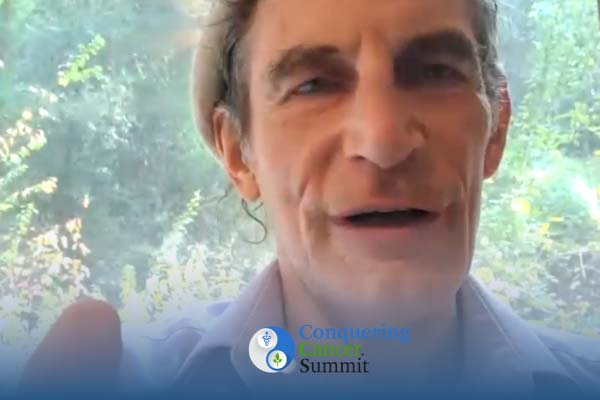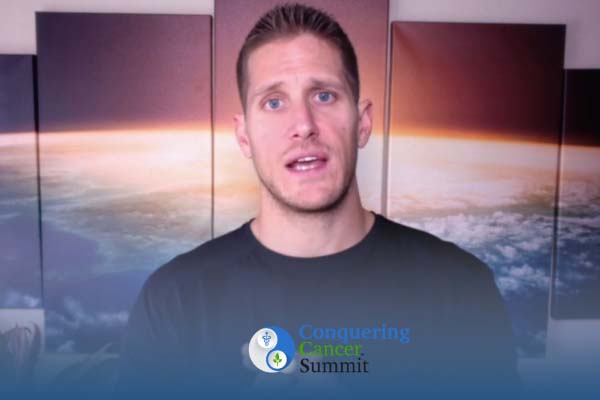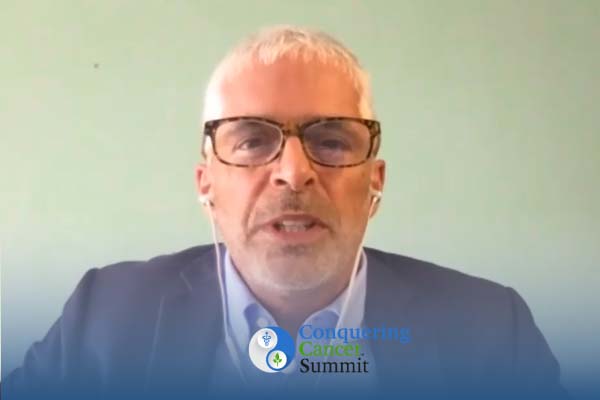Join the discussion below
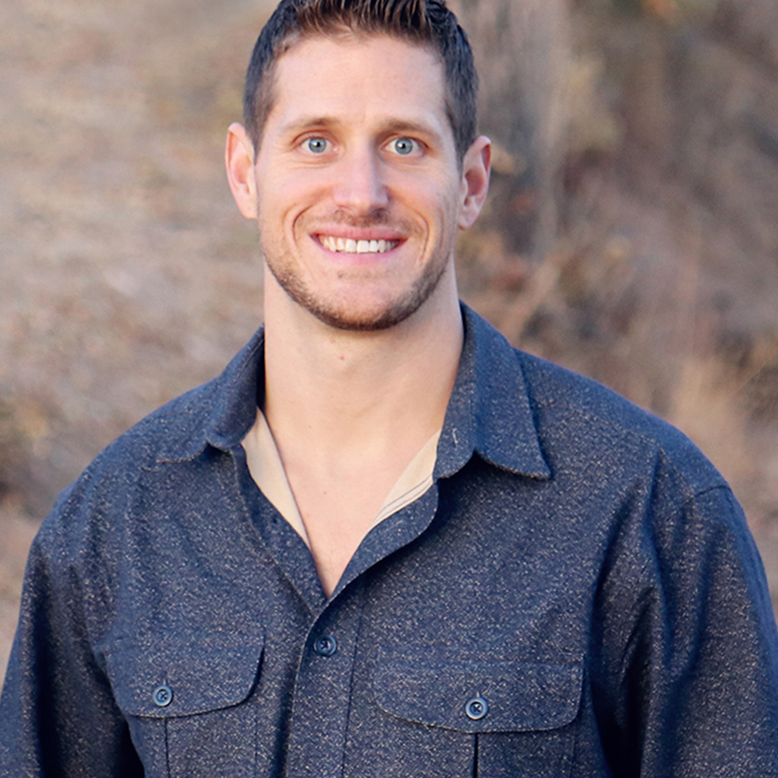
Nathan Crane is an award-winning author, inspirational speaker, plant-based athlete, event producer and 18x award-winning documentary filmmaker. Nathan is the Founder of The Panacea Community, Creator of the Global Cancer Symposium, and Director and Producer of the documentary film, Cancer; The Integrative Perspective. He is also the Director of Strategic... Read More
Steve’s personal journey with cancer and how he’s discovered the integrative approach.
How Steve’s tumor grew excessively after doing a biopsy.
Why Steve turned down chemotherapy after his surgery.
Detoxing and IPT as part of Steve’s integrative approach.
The integrative therapies Steve followed to help him heal.
Nathan Crane
Hey, it’s Nathan Crane, director of the Health and Healing Club and host of the “Conquering Cancer Summit.” And today I am honored and excited to welcome you to a very special interview. And I have a really wonderful story a very inspiring person to bring on with us today. And his name is Steve Wallis. He’s gonna be sharing with us his own journey through discovering the integrative approach to helping him deal and heal from, dealing with this cancer diagnosis and really heal on this journey. And so he’s gonna be sharing with us not only some of the questions he’s had along the way some of the doubts, some the fears, but also the protocols he’s discovered that has helped him the most.
And what he’s discovered from both conventional medicine, natural medicine, holistic and an integrative approach that has been helping him continue to see his markers just go down and down and down. So without further ado, Steve thank you so much for joining us and thank you for being here to really, you know, share your story in an effort to, to help inspire and educate and uplift others who are tuning into “The Summit.”
Steve Wallis
Thanks for having me.
Nathan Crane
So maybe you can start a little bit Steve with just a little bit about your background share with us kind of a little bit about your background maybe the condensed version.
Steve Wallis
Sure I live in Los Angeles with my wife. I own a small real estate development management company, where we live in a historic area. So we would buy older properties that have and basically run down, not very well maintained. We would restore them and frequently we would keep them and then just rent them out to our own tenants. And we continue to do that in working with old houses it’s quite likely that have been exposed to things like lead dust and maybe some and that sort of thing. And when we first started, we weren’t as really as as informed as we are today. So of course today, it’s just like with COVID we wanna take every precaution. And so now of course we take precautions as we work on these old houses, but back then we didn’t. And so don’t know if that could be a trigger for anyone. It could just be, you know the luck of the draw or roll the dice. But unfortunately I developed cancer in early 2014.
Nathan Crane
So 2014, so you were, what was the diagnosis and what was the prognosis at the time?
Steve Wallis
Squamous cell carcinoma, it was HPV related and it was in the, it was left neck and was I could feel a lump starting to grow in my neck and it turned out within a month that it was about the size of a plum. And so it, I went to urgent care about a month after I had basically discovered it, it grew fairly rapidly and I put a wrap with cod. I think it was cod liver oil on it and that actually arrested it and it stopped growing. And so I don’t know if that had any effect at all, probably not, but I did go to urgent care. He referred me to a doctor who was my surgeon and we scheduled a pet scan about just a couple maybe two weeks after I had gone to urgent care and also a biopsy. The pet scan showed that, yeah it was definitely suspicious.
There was a couple hotspots that we found, one at the base of my tongue, one a smaller one in the lymph nodes on the right side of my neck as well. He also scheduled the biopsy and scheduled surgery. What was really interesting is that only the tumor itself was not growing. It was not doing anything until I did the biopsy. And then that just made it angry and then it just, it quickly got larger and within a couple of days, I had had surgery to have the lymph nodes on the many lymph nodes on the left side of my neck removed.
Nathan Crane
Yeah we know from a lot of integrative medical doctors that I’ve interviewed over the years, that you know discourage against a biopsy as, you know, as cautiously as you can be just because it is known that once you start poking into that tumor and you start, you know, as you said, aggravating it making an angry.
Steve Wallis
Yes.
Nathan Crane
Basically you’re spreading it, right. You’re poking into something.
Steve Wallis
Right.
Nathan Crane
That’s encapsulated, that is trying to, you know, as some doctors will say, actually it’s trying to save your life is trying to, you know keep all of the cancer into one place instead of spreading through every organ of your body and totally, you know shutting you down with renal failure. It’s actually prolonging your life and so we go in and we start poking and prodding and trying to, you know and it often spreads it much worse as you said, it wasn’t growing biopsy, and then all of a sudden it grew even more.
Steve Wallis
Right.
Nathan Crane
So, then you had the surgery to remove the lymph nodes the, or the nodules. And then did you have the tumor removed at the same time?
Steve Wallis
Yes, yeah so the tumor and I think it was like seven or eight lymph nodes were removed at that time.
Nathan Crane
Okay, so you had that surgery and that was like, how quickly after your diagnosis?
Steve Wallis
After the pet scan, it was about a week and a 1/2 after the pet scan. And I think it was like the day after the biopsy is when I had had the surgery, but the surgery was already scheduled because, I mean it was fairly clear that that’s okay what it was.
Nathan Crane
So they, so they’re, so they said “Look, we just we need to remove this right away.” And so they went in and encouraged the surgery. You said, yes you did the surgery and then what happened?
Steve Wallis
So then my doctor referred me, it’s kind of it was interesting. The doctor who did the surgery, who’s was actually a Beverly Hills plastic surgeon which is really funny, who actually, who has done this sorts of surgery as well for other people. And so I was really happy to have him because he really never left a scar. He did a really good job about avoiding most of the nerves that normally I think any surgeon would just go in there and just start hacking you up. But I was really grateful to have him, he referred me to a couple of oncologists one for radiology and one for chemotherapy. And so my wife and I immediately went to see those doctors. The first was the one for chemotherapy, and it was probably the most frightening experience I’ve ever had with a doctor.
And he was basically saying, “You need this, you know “you need to take this effing seriously. “You need to go in like the army “and the Navy and the Marines “and just bomb the hell out of it. “And so basically nuke your body to kill the cancer. “And my wife and I, I can clearly remember it “in the elevator leaving him. “We both were just staring at each other, almost shaking.” And I said, “This just doesn’t feel right. “It doesn’t, to go through that sort of chemotherapy.” And I think we’ve all probably seen people who’ve gone through chemotherapy and it is horrific. And I just did not intuitively feel that for me that doing that with chemotherapy was right for me. We then went to see the oncologist for radiology. And she was actually wonderful again, Beverly Hills, I’m fortunate to live in Los Angeles and I had insurance, thank God.
And so I was able to take advantage of you know this great doctor if I wanted to, and talk in the line equipment where she said that the radiation would be pinpoint but I would still lose hair, I would still lose some taste. I would so all of these problems associated, even with top of the line equipment in 2014, that also did not feel right. You know, basically nuking with chemo and radiation to poison the body, to rid the body of something that was in itself. I don’t wanna call it poison, but it’s something that’s foreign to the body just did not seem right. So immediately after visiting them my wife was doing research. She read the book that Suzanne Somers had written. And one of the doctors that she used was a man named Michael Galsor in Santa Monica.
So we went to see him to basically detox and I had high toxicity in me of course, and Dr. Galsor recommended instead of chemotherapy maybe IPT, Insulin potentiation therapy. So, if I decided to do chemo that it would just be a fraction a one 10th the amount that I would normally have. That seemed to make sense so I started researching facilities in Southern California. That might be one to help me through that. I found Center for New Medicine in Irvine and so we immediately made an appointment and gosh, within I think five days after seeing Dr. Galsor and a week and 1/2 after having my surgery I went down to Center for New Medicine for the first time.
I had already had a second surgery schedule since it my Squamous cell carcinoma was HPV related. With that sort of cancer the origin of the cancer that ended up in my lymph nodes would be at the base of the tongue. And since the pet scan showed that there was a small hotspot there, I reluctantly made the decision to have the surgery to remove that. And so it was this like robot machine that they call it the da Vinci. So where they basically peel your throat. In the end they never found anything but likely there was something there, a tiny, tiny mass that they just never found. So I did do that surgery, but at the same time I was putting my faith in Center for New Medicine and basically going through a more healthy journey to eliminate the cancer from my body.
Nathan Crane
So aside from finding this integrative doctor, that you kind of learned of through Suzanne Somers book, right. Before that earlier in your life did you have any kind of affinity education background, connection to any more natural way of living a more natural lifestyle, more kind of, you know, holistic, just I don’t know if your parents, your family, peers, you know friends anything that kind of gave you a little bit of that foundation to support your intuition and going “Look, this chemical approach “this war approach of destroying my body “through radiation, chemotherapy, drugs and so “just doesn’t feel right to me.” Did you have some kind of foundation early in your life that that helped contribute to that?
Steve Wallis
Surprisingly, not really. I grew up in rural Pennsylvania where as a kid eating cereal, just you know it was extremely sugary and then putting sugar on top of that. And there was just so many things looking back and like “Oh my God, I can’t believe we ate that stuff.” Unfortunately I mean, we did rather except for that we didn’t really eat a lot of sweets, which was good I guess. But it’s really, I owe a lot of it to my wife. She is a personal trainer who is really attuned to the human body and what makes it most optimal, how to function optimally. And so we’ve always eaten pretty well, since and I’ve been with Eileen for gosh, going on 30 years now. And so we you know, I never drink sodas really don’t eat a lot of sugar and really hardly any at all don’t eat junk food, don’t eat fast food. So that’s been my lifestyle since basically I left Pennsylvania and moving here to California. And so I’m really grateful for that but here we have a lot of other toxicities in Los Angeles, you know, it’s just bad air. There’s a lot of stress is toxic and so that’s been like the big negative.
So we try to counteract that in ways but intuitively the chemo the radiation just did not feel right. It just everything about it just seemed wrong to me. I have a neighbor, she was really healthy as an ox. She got breast cancer a form that apparently was not that serious. And she was probably in her late 60s I guess. And again, extremely healthy and then she, I think had surgery and then she started chemo. And after the second round of chemo, it killed her, she died. And it’s just horrible to hear things like that. And again we’ve all seen people who have had chemotherapy, which could be I’m told that chemotherapy might be the right choice for some people. I don’t know, I’m not a doctor, but in my case, it just it’s something that I definitely did not wanna do.
Nathan Crane
Yeah I mean, it’s a good point. There are some cancers that respond a lot better to than others. I mean there are some cancers I believe it’s testicular cancer that has like a 50%, you know effective rate with chemotherapy. It’s like flipping a coin, but that’s still pretty high when it comes to a cancer treatment there are other most cancers they’ll have about a 2 1/2% success rate with a straight chemotherapy treatment protocol 2 1/2% so it’s a pretty low success rate and some cancers have 0% success rate. So that’s why, you know this conversation of an integrative approach is so important no matter what somebody chooses like yourself that did surgery. And then you found, you know, a much more, more things you can do for your health and lifestyle that can support your body and healing which we’ll talk a little bit more about or even some low dose IPT some low dose, where like you said 110th of the amount of chemotherapy is very targeted at the tumor, for example or at the cancer. But you’re also doing all the other things to enhance the body’s natural mechanisms to eliminate the cancer cells like enhancing the immune system, for example.
So, you know that’s why, you know through this event and all of the conversations are primarily around like, look let’s do what works, let’s do what we know what works and then let’s do what everything we possibly can to support the body’s natural healing ability. Right, we know that if we support the immune system or lymphatic system, we support the nervous system, we support all these incredible systems in the human body with as many, you know natural, holistic things we can do. And then if we need a little surgery, a little IPT or a little something else to support it, your your chances and your odds of not only surviving the cancer but actually having a better quality of life which I’m excited for you to share about Steve.
Because when we last spoke that’s one of the things that’s been, you know such a blessing for you is your quality of life has been so great because of the choices you’ve made for your own, you know, treatment protocols. So let’s, maybe you can pick up from where you left off there a little bit. So you found Center for New Medicine. What were the, and before that they still had said they were still concerned, right? That you still had some hotspots, you still had you know your markers were still high. Is that right? That’s why you were continuing to Center for New Medicine.
Steve Wallis
Yeah and so I was encouraged by my surgeon to have surgery on the right side of my neck as well, to remove lymph nodes there. And I was not convinced that that’s what I should do. So I, he said, you need to do it now. You need to quickly quickly, you need to get radiation. You need to get chemo, you need to have this other surgery as soon as possible. And my intuition told me that that was not the case and so I never had that surgery. I did go to and I did wanna make one last point on the chemotherapy that talking to that oncologist, I asked him “How do you know what chemotherapys “would be right for me?” And he said, “Basically, I’ve been doing this for years. “And so it’s basically, I just kinda feel it out. “And so it’s just, my experience will tell me “that normally this will work for you.” So it’s basically he’s rolling the dice on something that might have minimal effect that might have maximum damage to my body.
So that was extremely scary. So then in going to Center for New Medicine, it was it I think I’m relatively analytical. So I wanna know, like with the chemotherapy I wanna know if I’m gonna get chemotherapy that it’s right for me. If I’m doing something, I wanna know that it’s actually working I just don’t want to just guess or hope for the best. And so at least with Center for New Medicine they immediately did some tests to find out, you know, what how many CTC count for how many circulating tumor cell were in my body. It was elevated, there’s also nagalase which is which is an indicator that how it, nagalase masks viruses and cancer.
And so I had a high nagalase count. And so I wanted to get obviously my circulating tumor cell count down. I also needed to get my nagalase count down and I needed to be healthy as possible. And through Galsor he has a test for toxicity. So my toxicity was almost pegged out. So I needed to get that down. So I was testing for toxicity I wanted a test for circulating tumor cells and I wanted to test for nagalase. So they’re like you said there are many different things that one can do do to make the body healthy enough to combat cancer. And as I understand it, everyone has cancer cells in them.
Nathan Crane
Right?
Steve Wallis
A healthy body can keep it that under control and keep those cancer cells to an absolute minimum. If the body’s out of luck if it’s not healthy, if it’s toxic, then you go into imbalance and the body can’t basically heal itself. And so I wanted to make sure that I was healthy as possible and I wanted to do as many different things as that I could afford to do and that I had access to, to get that down. So there’s a lot of things that are fairly inexpensive that I did. Again, it’s really hard to quantify if what one particular thing helped when you’re doing a lot of things. So, you know, green tea is always recommended the juice from one lemon in the morning on an an empty stomach to get toxicity down, things like that and then Center for New Medicine there were many things that I started to do with them as well. The hyperbaric chamber, high doses of IVC, gosh there were gosh, PEMF and then goleic shot injections of goleic which would specifically go after the nagalase. And so those are some of the things that I was doing.
My wife also was giving the supplements of IP6 beta-glucan things like that would help, D3 and then Center for New Medicine had me, I think it was DHEA pregnenolone, those things were apparently good for me, in different there’s different cancers, and cancers react differently to different people. So in my opinion, it’s never the same for everybody. It’s almost individualized and everybody has to see what works for them. Again, like you said maybe IPT will work for somebody or even full on chemo for someone, maybe it does it. And then maybe this might work, maybe that might work, but I was measuring again the circulating tumor cell count, my toxicity count in the nagalase counts to make sure that they’re going down and things that, you know somethings didn’t work for me and I dropped them.
And again, it’s an expense thing as well. Everybody, you know, who among us are so rich that you could do everything and there’s just a few people. And so we really have, we wanna be better, we wanna be healthy but we have a finite amount of resources typically. And so just measuring and just almost intuiting what you feel is working for you. So yeah, we kind of threw the, you know threw everything out. We tried everything and started throwing out things that didn’t appear to be helping my specific numbers.
Nathan Crane
You know I think it’s so important what you just said around, you know, using your own intuition to help discover what works for you. And so often, you know we have a hard time trusting ourselves but if you can learn to listen to your body learn to listen to yourself, your inner wisdom more often than not, you’ll hear people say, you know I just felt that wasn’t right and I felt I should do this and they did that. And months or years later they had the outcome they were looking for. And it was a feeling, it wasn’t logic. It wasn’t a scientific report that they read, it wasn’t, you know, listening to the doctor said you have to do this or you’re gonna die. It was maybe taking into account all of those things but then taking a moment to go inside and say, “Okay, what do I feel is right for me?” Right, and that is, I literally just had a group session with a group of cancer patients who’s a part of our health and healing club.
And, you know there was a wonderful woman who was there sharing her story and her journey and her challenges and her fears and everything that’s coming up and she’s dealing with cancer. And, you know this is the exact topic that we talked about was you know, learning to trust yourself, learning to trust that inner guidance. Yes, we need to educate ourselves. We need to listen to interviews like this, we need to research, we need to absorb as much of this kind of information as possible, listen to every one of these interviews and listen to every one of them again and take notes and ask questions. And like that’s key, right? To inform ourselves, to educate ourselves, to gain as much information knowledge as we can so we’re more confident in what we’re choosing to do and then have guidance, but at the end of the day we are the ones that we’re making the decisions, right.
If we just leave it up to somebody else to make decisions for us, sometimes that works out, sometimes it doesn’t. But I really believe more often than not if you learn to, to listen to your own body and what you feel is gonna work for you and you follow that and trust it and stay open along the way more often than not, things will work out. And you’re a great example of that, Steve. So maybe you could share a little bit more of that. So your CTC count and your nagalase count were super high after surgery. You started more of an integrative approach doing all of the, you know doing more natural therapies and hyperbaric and all these different things. That’s been what, the last five years now and where are your CTC and where’s your nagalase now?
Steve Wallis
So I, within the first year I dropped the IVC and the hyperbaric and the PMF. I found for me the goleic was working to get the nagalase down. And what was interesting is my circulating tumor cell count was dropping very slowly at first for the first year. You know it was coming down, but just little by little. My CTC count was in may of 2014, it was 12.6, which is super high. And my nagalase count was 3.2, with the goleic my nagalase started to come down in faster clip. And so the goleic really worked for me. There were Bravo, there’s like a Bravo depository which they had for a while. And then I still eat a Bravo yogurt. And that seems to help a lot as far as the nagalase. And now I’m basically in I have a normal count of, well, basically normal 0.6 from 3.2 down to 0.6 in those, I don’t know, you know 6 1/2 years or so seven years.
And so the CTC count was going down slowly but as soon as I got my nagalase under control and it starting to get close to normal then it just, it just dropped dramatically. And so my CTC count in may of 2014 at 12.6. And then right now it’s 4.8, which is still high but it’s you know, a third of what it was. So again, that’s, you know a way that I was able to measure my health and then also my toxicity within a couple months I got it down to basically normal. So from being pegged and being normal, and I think that all of these things kind of help each other.
Nathan Crane
Absolutely.
Steve Wallis
And I had, my second pet scan was I think a year after it was, must have been 2015. And so then I no longer had a hotspot on the right side of my neck, so that was gone. So yeah, no more hotspots, which I’m grateful for.
Nathan Crane
Yeah that’s exciting, I mean that’s huge progress, right? I mean, not even showing up on the scans anymore on the pet scan, nagalase down to normal range. CTC cut, you know by two thirds down and that’s a 1/3 of what it was. I mean, incredible progress. And maybe talk a little bit about the quality of life you’ve had in the last what seven years now from 2014. Well, let’s say after the surgery, until now what’s your quality of life been like on this path?
Steve Wallis
Again, I feel almost guilt and I don’t want to be to glib but my mother died of breast cancer at age 37. And so I saw what she went through and I remember as a kid thinking, “I just wish that I knew that we would be able “to better treat cancer sometime in the future. “And unfortunately it would not, was not” that technology was not wanting to help her. And so it was horrible to see what she went through. And then I had the benefit of technology basically, and just basically information that helped me heal the way that she couldn’t. And so I had, again the surgery on my lymph nodes you know, so you have a scar that you know you have an incision that heals fairly quickly. The throat surgery was extremely, extraordinarily painful, but after that, it has been I’ve had no life change at all. I didn’t have any issues with people who the people have with radiation and certainly no issues like people that would have from chemo.
And so I’ve lived basically a normal life since I heal from those original surgeries. And yeah, having seen what other people go I mean today what people go through with chemo and radiation and their surgeries. And I had none of that. And there was a friend of a friend in Pennsylvania who had the exact same cancer that I did. And in Pennsylvania, they’ve got, you know their resources are very limited. And again, it’s all chemo or radiation, chemo or radiation and that young man, he was I think in his late 30s he died from that exact same thing. And I know that it doesn’t happen for everyone, but it just it’s a stark reminder of how poisoning the body to heal the body to me just doesn’t make any sense at all. A healthy body could heal itself in my opinion but a poisoned body just can’t heal at all.
Nathan Crane
Yeah so powerful. Steve I just, I wanna thank you so much for coming on and sharing your story. I, my hope with this summit and with all the work we continue to do is that your experience is one that millions of others can experience as well so that you don’t have to feel guilty that you know, you get to live this normal quality of life while others suffer, because this way of treatment this integrative approach, this approach of utilizing the best in medicine that we have whatever field it is, if it’s working and it’s effective and the individual feels good with that approach. And it’s really about supporting the health of the body for the longterm, that that becomes the norm for the future. Not that these are the a few thousand cases that we hear of ’cause there are thousands now that the data’s collecting more and more of very similar cases and experiences like yours but they become the millions of cases.
It becomes the norm, that’s really our hope with this. And you know, and it’s really about education. It’s really about getting this kind of information out to more people around the world. And congratulations Steve for you know, where you are. I just wish you so much health and continued to healing and happiness and you know just strength and courage on your journey forward and thank you for coming here to share this with all of our listeners so that they can hopefully glean a little something from your own journey to take into their lives, to help them on their path of healing and health and longevity so appreciate it.
Steve Wallis
Thanks for what you do and thanks for allowing me to be a small part of that.
Nathan Crane
And I wanna thank everyone for tuning into the “Conquering Cancer Summit. Please share this with friends and family, together we truly can make a difference for the future of humanity in ending the cancer pandemic. Thank you, and I wish you ultimate health and happiness, be well.
Downloads

